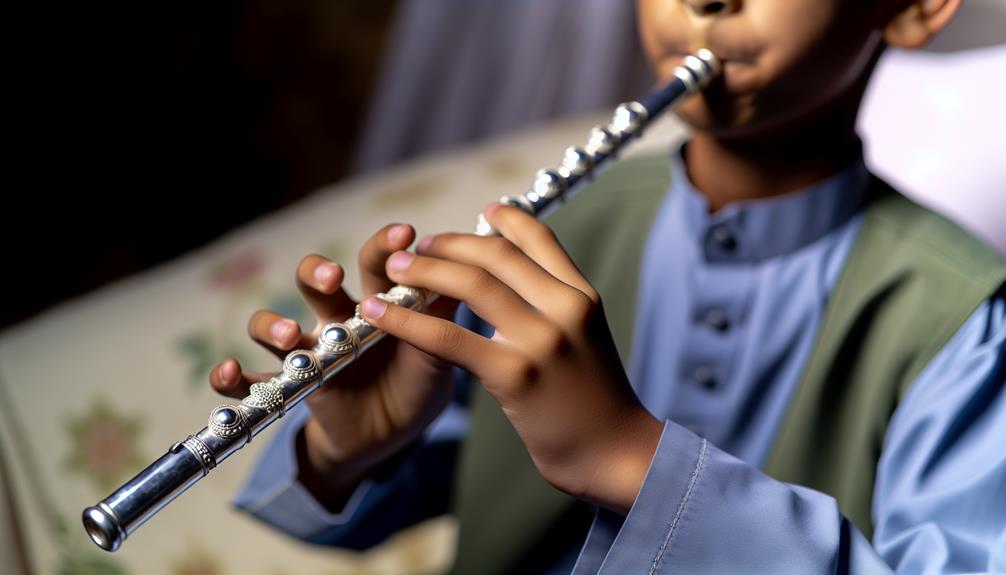Exploring the realm of music through learning an instrument can be a fulfilling journey for many young individuals. When it comes to the question of whether a 12-year-old can play the flute, considerations of physical development and cognitive abilities come into play.
While age can be a factor, it is not the sole determinant of success. Factors such as commitment, guidance, and motivation can greatly influence a young flutist's progress. Understanding the nuances of this musical pursuit and the support system around the budding musician can pave the way for an enriching and harmonious musical experience.
Key Takeaways
- Learning flute at 12 fosters discipline, creativity, and emotional expression.
- Practice and dedication are crucial for mastering the flute at a young age.
- Choosing the right flute ensures a successful and enjoyable musical journey.
- Parents play a vital role in supporting and nurturing young flutists.
Benefits of Learning Flute at 12
Learning to play the flute at the age of 12 can provide numerous cognitive and emotional benefits for young individuals. Mastering the flute requires discipline, focus, and creativity, qualities that can significantly enhance a child's cognitive development. By learning to read sheet music, understand musical theory, and coordinate both hands and breath control, young flutists can improve their memory, concentration, and problem-solving skills.
Moreover, playing the flute can be a deeply emotional experience for children. Music has the power to evoke a wide range of emotions, allowing young players to express themselves in a unique and profound way. The flute's melodious tones can help children connect with their feelings, reduce stress, and boost their self-confidence. Additionally, learning to play an instrument like the flute can foster a sense of belonging and camaraderie, as young musicians often form bonds with their peers through shared experiences and performances.
Importance of Practice and Dedication
Having established the benefits of learning the flute at the age of 12, it becomes evident that the importance of practice and dedication cannot be overstated in honing one's skills on this instrument. Playing the flute, like any other musical skill, requires consistent practice to improve. Regular practice sessions help familiarize the player with the instrument's nuances, leading to better control over tone, pitch, and technique. Dedication is equally crucial; setting aside time each day to practice, even if only for a short period, can yield significant progress over time.
Additionally, dedication goes hand in hand with setting goals. By establishing clear objectives, such as learning a new piece or mastering a challenging technique, young flutists can stay motivated and track their improvement. Celebrating small victories along the way can boost confidence and reinforce the commitment to practice regularly. Moreover, seeking guidance from a skilled instructor can provide valuable feedback and direction, ensuring that practice time is spent effectively. Ultimately, the combination of regular practice, dedication, and guidance plays a vital role in a 12-year-old's journey to mastering the flute.
Choosing the Right Flute for Beginners
Selecting the appropriate flute for beginners is a crucial step in ensuring a solid foundation for young musicians embarking on their musical journey. When choosing a flute for a beginner, it is important to consider factors such as the age and physical size of the player.
For a 12-year-old starting out on the flute, a student or beginner model flute is typically recommended. These flutes are designed to be durable, easy to play, and affordable for young learners. Additionally, the material of the flute is important; beginner flutes are often made of nickel silver or silver-plated material, which provides a good balance between quality and cost.
It is advisable to consult with a music teacher or a professional flutist when selecting a flute to ensure that it meets the needs of the young player. By choosing the right flute for beginners, parents and young flutists can set the stage for a successful and enjoyable musical journey.
Tips for Parents of Young Flutists
When supporting young flutists, parents can enhance their child's musical journey by fostering a conducive practice environment at home. Here are some tips for parents of young flutists:
- Establish a Routine: Encourage your child to practice the flute at the same time each day to create a consistent habit.
- Provide Encouragement: Offer positive reinforcement and praise to boost your child's confidence and motivation.
- Create a Quiet Space: Designate a quiet area in the house where your child can practice without distractions.
- Attend Performances: Show support by attending your child's recitals or performances, fostering a sense of pride and accomplishment.
Fun and Engaging Flute Exercises
To enhance a young flutist's skills and keep practice engaging, incorporating fun and creative flute exercises can be both beneficial and enjoyable. These exercises not only help in mastering techniques but also make the learning process more enjoyable. Here are some fun and engaging flute exercises that can be incorporated into practice sessions:
| Exercise | Description | Benefits |
|---|---|---|
| Air Stream | Practice blowing air through the flute without making a sound. | Helps improve breath control and tone production. |
| Tonguing with Syllables | Use syllables like "tu" or "du" to practice articulation while playing scales. | Enhances tonguing technique and helps in playing with clarity. |
| Rhythm Clapping | Clap different rhythms while counting out loud to improve rhythm accuracy. | Develops a sense of rhythm and helps in maintaining a steady tempo. |
| Dynamics Rollercoaster | Practice playing the same passage with varying dynamics, from pianissimo to forte. | Enhances dynamic control and expression in playing. |
Incorporating these exercises into daily practice routines can make learning the flute more engaging and rewarding for young flutists.
Frequently Asked Questions
Can Playing the Flute at a Young Age Affect a Child's Academic Performance?
Playing the flute at a young age can positively impact a child's academic performance. Research suggests that learning a musical instrument, like the flute, can improve cognitive skills such as memory, attention, and problem-solving abilities.
Additionally, playing an instrument can enhance creativity and discipline, which are valuable traits for academic success. Therefore, introducing a child to playing the flute at a young age may have beneficial effects on their overall academic performance.
Are There Any Health Risks Associated With Playing the Flute at a Young Age?
Playing the flute at a young age can lead to potential health risks such as musculoskeletal issues due to poor posture or repetitive strain injuries from overplaying. It is crucial for young musicians to receive proper guidance on posture, technique, and regular breaks to prevent these risks.
Additionally, exposure to loud sounds without proper hearing protection could potentially lead to hearing damage over time. Proper education and supervision are essential to mitigate these health risks.
How Can Playing the Flute at 12 Impact a Child's Social Life and Relationships?
Playing the flute at 12 can positively impact a child's social life and relationships. It can foster a sense of belonging and connection through participation in music groups or bands.
Learning a musical instrument can also help develop social skills, such as teamwork, communication, and confidence, which are essential for building strong relationships.
Additionally, shared musical experiences can create bonds with peers and cultivate a sense of community.
Is It Necessary for a 12-Year-Old to Take Private Lessons in Addition to School Band or Orchestra Classes?
It can be beneficial for a 12-year-old to supplement school band or orchestra classes with private lessons. Private lessons offer individualized attention, allowing for customized instruction that can address specific strengths and weaknesses.
This personalized approach can lead to quicker skill development and a deeper understanding of musical concepts. Additionally, private lessons can cultivate a greater sense of discipline and commitment in young musicians, ultimately enhancing their overall musical abilities and enjoyment.
Are There Any Specific Challenges That a 12-Year-Old May Face When Learning to Play the Flute Compared to Older Students?
When learning to play the flute, a 12-year-old may encounter unique challenges compared to older students. Physical dexterity and lung capacity may still be developing, impacting breath control and finger coordination.
Additionally, concentration levels and attention span can vary among individuals in this age group, requiring tailored teaching strategies.
Despite these hurdles, with dedicated practice and patient guidance, a young flutist can overcome these obstacles and flourish in their musical journey.
Conclusion
In conclusion, learning to play the flute at 12 years old can offer numerous benefits such as improved cognitive skills and creativity. It is important for young flutists to practice regularly and stay dedicated to their craft.
Choosing the right flute for beginners is essential for a successful learning experience. Parents can support their child by encouraging and providing guidance throughout their musical journey.
One interesting statistic to note is that children who play musical instruments are 52% more likely to excel academically.

